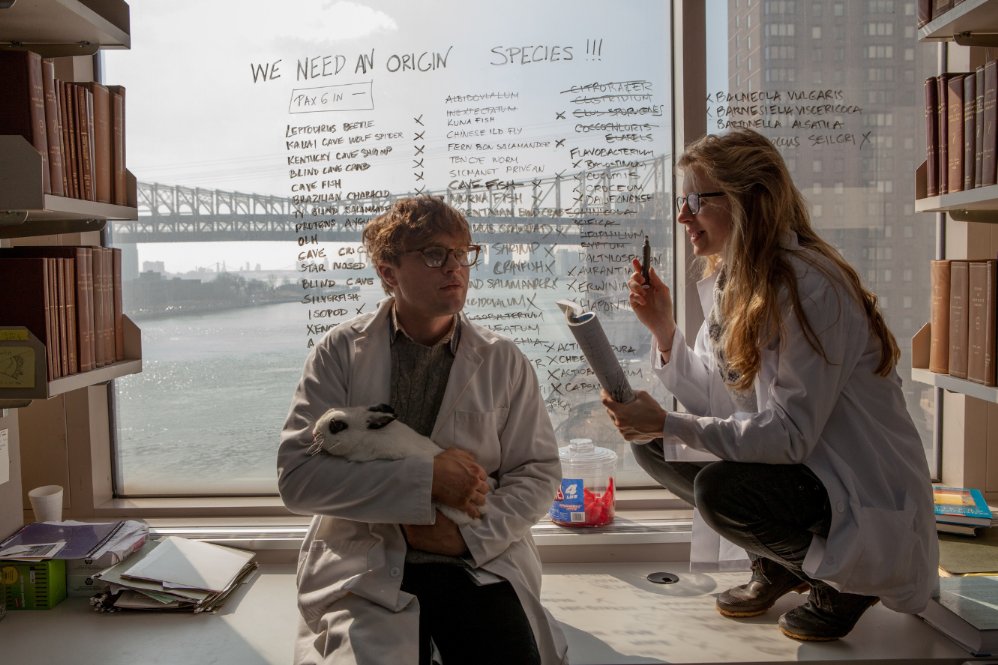
Written and directed by Mike Cahill
USA, 2014
The movies have long had an intimate fascination with the human eye. They’re the tools with which we absorb film, we view them as a window to our soul, and they’re one of the most romantic parts of the body. No one ever romanticized an ear.
Mike Cahill’s I Origins takes that fascination to a new level. It passionately and profoundly ties our eyes to our beings, resonating as a film of science and spirituality. It’s an indie romance that uses broad sci-fi set-pieces in subtle, yet grandly melodramatic gestures to challenge our faith and our fear of the unknown.
Cahill’s first film was the underrated sci-fi gem Another Earth, a movie that, amid layered character drama and romance, asked a simple, high-concept question: if you could meet yourself, what would you say? It’s a question that may appear to have an easy answer, but introduces an array of existential dilemmas and, best of all, starts a conversation. Those willing to follow Cahill down the rabbit hole were treated to the film’s broad school of thought and appropriately grand gestures, moods and melodrama to accompany the big ideas. Those who saw Another Earth as pretentious only got riddles and eye rolls from his elaborate, potentially fruitless ramblings. Though a much more analytical film, I Origins poses something similarly challenging: what would you do if something spiritual tested your scientific understanding of the world?
Dr. Ian Gray (Michael Pitt) is a young, jaded and detached biologist with a fascination with the human eye. At a Halloween party, he photographs a masked woman’s eyes and, in a whirlwind, has sex with her. His questions push her away, and she vanishes. In the lab, he reveals to his new assistant, Karen (Brit Marling), that he’s turned away all his other students and signed their credits anyway. But Karen stays on to help him finish research on the evolution of the eye that will disprove intelligent design. He blatantly wants to shut God out of his world, and it takes a miracle to give him some faith. A lucky streak leads Ian to a billboard with the pair of eyes he photographed at the party, discovering they belong to the lovely Sofi (Astrid Bergès-Frisbey). The two fall madly in love, only for him to lose her and embark on a trip to India in the hopes of tracing her eyes and her spirit.
Everything in the plot almost certainly goes over too perfectly, and each moment and tender line of dialogue can be plainly read as symbolic for a way to look at the world. Sofi’s Manic Pixie Dream Girl is far too perfect a figure for a spiritual beacon, while Ian and Karen’s work of building an eye for a worm that cannot see withholds no subtlety at the idea of an unseen world we can’t begin to process but somehow can detect is there. But Cahill earns each and every broad stroke he places onto his canvas. I Origins is as unique as the human eyes it represents, with as many details as the most memorable of iris patterns, and the film’s feverish, investigative pacing toward science, love and spirituality is akin to the vibrant color that allows us to see the world more clearly.
Some critics have argued that the intensely self-serious indie film has become a cliché in storytelling style, but just as in Another Earth, the major gestures and swells of melodrama are earned through the more intimate human moments that never become secondary to the story. Pitt, Marling and Bergès-Frisbey share a wonderful chemistry. Cahill has written them as wry and witty as they are solemn and poetic, and they pour through dense jargon and ideology with ease. The cast only adds to the film’s energy and excitement at discovering what other secrets the scientific and spiritual worlds hold.
For a film about eyes, it also has a rightfully rich and distinct way of observing the world. The lens flares dancing in front of the camera serves the purpose of seeing an added dimension and a figurative reflection of our own watching eye. In the near inspired use of Radiohead and others on the soundtrack, Cahill makes the film feel rapturous and musical. I Origins isn’t just a college lecture about existentialism, but existentialism as conveyed through cinema.
Back to the film’s question: what would you do if something spiritual tested your scientific understanding of the world? I Origins itself grapples with the more literal and fantastical layers of its story. Its success is proof that maybe both spirituality and science can coexist too.
— Brian Welk
I Origins screens as part of the Fantasia International Film Festival on 19th July at 5pm. Please visit the official website of the Fantasia International Film Festival for more information.


